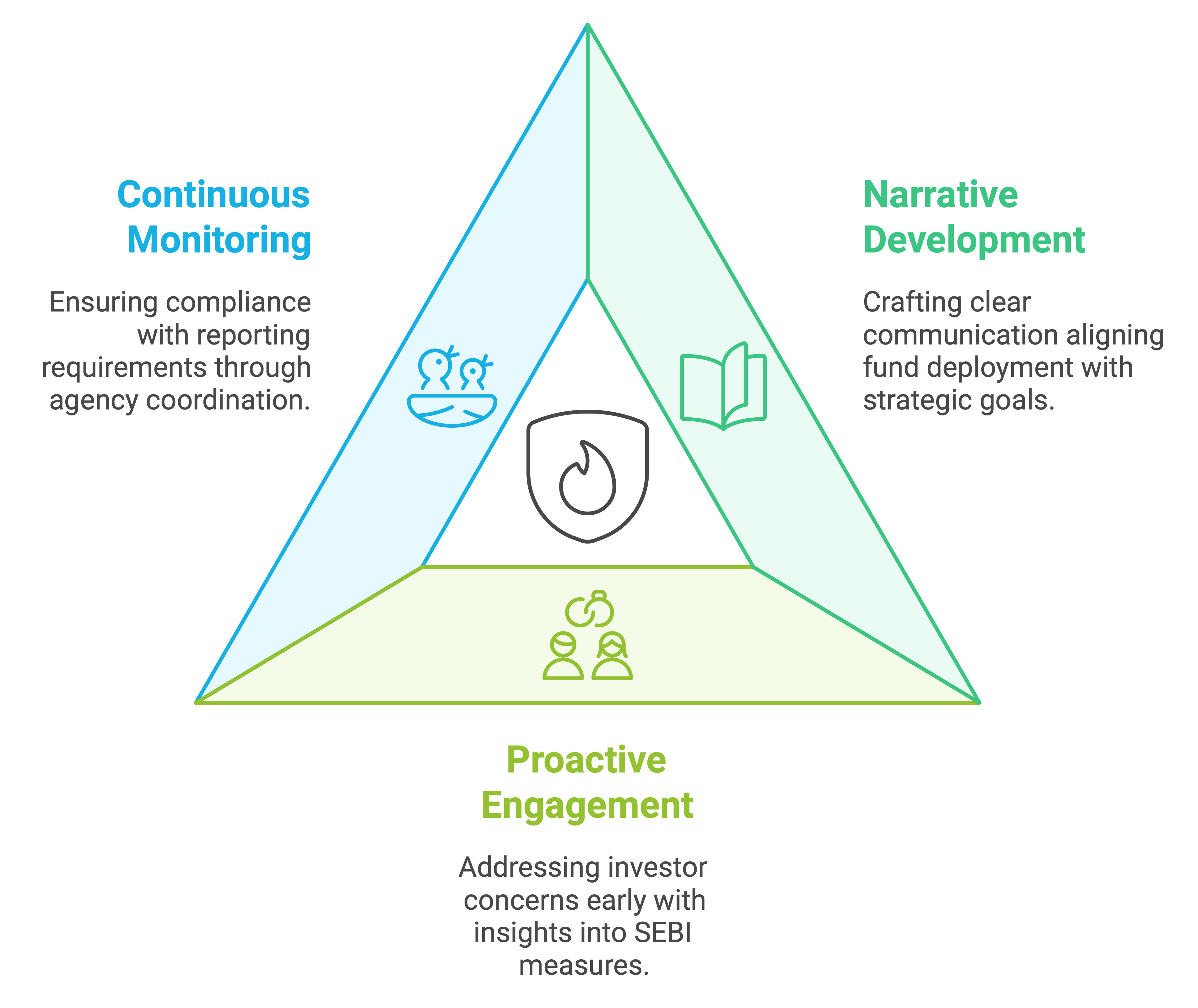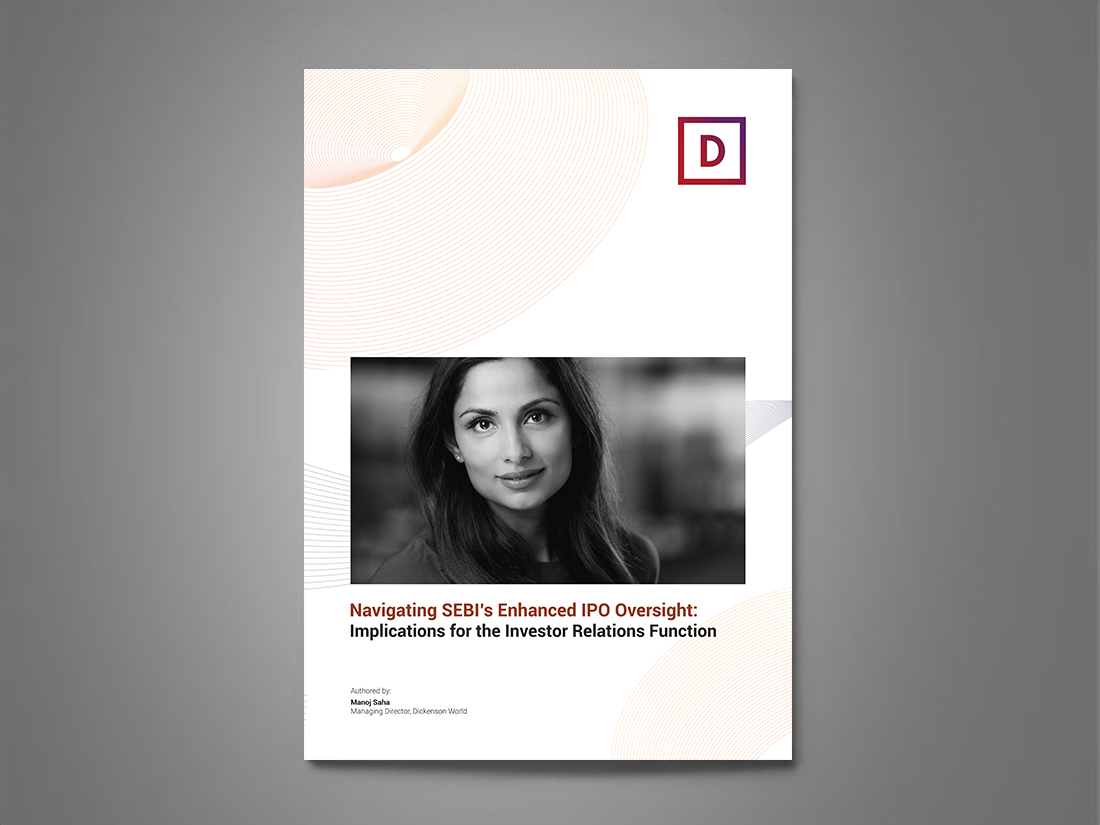Navigating SEBI’s Enhanced IPO Oversight:
Implications for the Investor Relations Function
In the rapidly evolving financial landscape, the Securities and Exchange Board of India (SEBI) has emerged as a key proponent of transparency and accountability in capital markets. One of its most impactful initiatives in recent times has been the introduction of measures to oversee how newly listed companies utilize funds raised through Initial Public Offerings (IPOs). These changes, aimed at curbing fund misuse, protecting investors, and bolstering market efficiency, set a higher bar for corporate governance in India.
Here, I aim to explore the implications of SEBI’s planned enhanced regulatory framework, its implications for newly listed companies, and the role of the Investor Relations (IR) function in navigating this paradigm.
Strengthening Fund Utilization Oversight: SEBI’s Renewed Focus Amidst IPO Boom
The Securities and Exchange Board of India (SEBI) has long mandated that companies raising over ₹100 crore through Initial Public Offerings (IPOs) appoint a monitoring agency to oversee fund utilization. Previously, this requirement applied only to issues exceeding ₹500 crore. However, in light of the unprecedented volume of IPOs and the recordbreaking fund raising activity in the Indian markets, SEBI has placed greater emphasis on ensuring compliance and transparency in this area.
The monitoring agency, now required to be a SEBI-registered credit rating agency, must provide quarterly reports detailing how IPO proceeds are being deployed. These reports must undergo scrutiny by the company’s audit committee and be made publicly accessible on stock exchanges and the company’s website. This renewed focus ensures that investors are given real-time visibility into fund usage, reducing the risk of misuse and fostering trust in the integrity of capital markets.
Restricting Unspecified Fund Allocations: A New Layer of Accountability
While SEBI has always emphasized accountability in fund deployment, it is now tightening the reins further by limiting how IPO proceeds can be allocated for unspecified purposes. Under the updated framework, companies are restricted from allocating more than 35% of their total funds toward general corporate purposes (GCP) and unidentified acquisitions combined. Of this, a maximum of 25% can be earmarked for acquisitions that lack clarity at the time of the IPO.
These measures have become particularly critical as the Indian markets witness a surge in IPO activity. With a growing number of companies accessing public markets, the risk of vague or inefficient fund deployment has also increased. By enforcing these stricter rules, SEBI aims to ensure that IPO funds are directed toward well-defined, value-creating initiatives, thereby protecting investor interests, and maintaining the robustness of India’s capital markets.
SEBI’s Role in a Changing Landscape
The Indian capital markets have experienced exponential growth in recent years, marked by an influx of new IPOs and significant capital inflows. This surge underscores the importance of regulatory vigilance to safeguard investor trust and market stability. SEBI’s renewed focus on implementing and enhancing these longstanding requirements demonstrates its commitment to ensuring that the unprecedented capital raised is utilized responsibly and transparently.
These measures are not just about compliance they are about reinforcing the pillars of governance and accountability that underpin a thriving and equitable market ecosystem. As SEBI tightens its oversight, companies and investors alike stand to benefit from a financial environment that prioritizes clarity, integrity, and sustainable growth.
Enhanced Disclosure Requirements
In a bid to close information gaps and expedite the clearance process for IPOs, SEBI is also tightening its disclosure norms. Companies must now disclose detailed information about potential conflicts of interest involving management, directors, large shareholders, subsidiaries, and service providers. This measure not only fosters transparency but also equips investors with a clearer picture of the risks and dynamics surrounding the issuing entity. For IR professionals, this development underscores the need to craft detailed and accurate narratives about the company’s structure, governance, and risk mitigation strategies.
Investor-Centric Measures
Lock-in Period for Anchor Investors: SEBI has extended the lock-in period for 50% of the shares allotted to anchor investors from 30 days to 90 days. This measure aligns the interests of anchor investors with retail investors, discouraging
shortterm speculation and contributing to market stability.
Offer for Sale (OFS) Restrictions: To address concerns about significant shareholders exiting at the time of the IPO, SEBI has prescribed limits on the number of shares they can sell. Shareholders with over 20% of pre-issue holdings can now
sell only up to 50% in an OFS, while those with less than 20% are capped at 10%. These restrictions protect investor confidence by preventing large-scale divestments that could signal a lack of faith in the company’s future.
Implications for Newly Listed Companies
These regulations are more than compliance requirements; they represent a strategic opportunity for companies. By aligning fund utilization, disclosures, and shareholder strategies with SEBI’s mandates, newly listed companies can build a reputation for integrity and reliability in the market. Companies should view these measures not as constraints but as enablers of sustainable growth. A well-monitored, transparent approach to fund utilization not only satisfies regulatory requirements but also enhances investor confidence, paving the way for long-term success.
The Role of the Investor Relations Function
The Investor Relations function is uniquely positioned to help issuers navigate this enhanced regulatory framework. Key areas where IR professionals can add value include:

-
Strategic Narrative Development
A well-crafted narrative is central to maintaining investor confidence, particularly in a regulatory environment that prioritizes transparency. Investor Relations (IR) professionals play a critical role in articulating how the company plans to utilize IPO funds and align these deployments with its broader strategic goals.
- Clarity in Objectives: IR teams must work closely with company leadership to ensure that the objectives outlined in the IPO prospectus are communicated effectively. This involves breaking down technical or financial jargon into simple, compelling language that resonates with diverse investor audiences.
- Connecting Fund Utilization with Growth Strategy: Investors are keen to understand how the deployment of IPO proceeds will drive tangible business growth. IR professionals should emphasize how specific investments—whether in capacity expansion, technology upgrades, or acquisitions—fit into the company’s long-term vision.
- Tailoring Communication for Stakeholders: Different investor segments (institutional, retail, and anchor investors) may have unique concerns and priorities. IR professionals must customize their messaging to address these nuances while ensuring consistency in the core narrative.
-
Proactive Engagement
Investor engagement doesn’t end after the IPO; it’s a continuous process that requires vigilance and responsiveness to stakeholder concerns. SEBI’s tightened regulations provide an opportunity for IR teams to proactively highlight how these
measures enhance investor protection and promote accountability.- Regular Updates:: By providing timely updates on fund utilization, project milestones, and performance metrics, IR professionals can reassure investors about the company’s progress. This includes sharing insights into how SEBI’s monitoring requirements are being adhered to and the outcomes achieved.
- Hosting Investor Meetings and Calls: Organizing regular investor calls, webinars, and meetings allows the company to address queries, clarify concerns, and reinforce its commitment to transparency.
- Educational Content:IR teams can create educational materials, such as infographics or explainer videos, to demystify regulatory changes and illustrate how these measures benefit investors. For example, explaining the rationale behind SEBI’s restrictions on
unspecified acquisitions can strengthen investor confidence in the company’s governance practices.
- Regular Updates:: By providing timely updates on fund utilization, project milestones, and performance metrics, IR professionals can reassure investors about the company’s progress. This includes sharing insights into how SEBI’s monitoring requirements are being adhered to and the outcomes achieved.
-
Continuous Monitoring and Compliance
SEBI’s requirement for quarterly reports on fund utilization places the onus on companies to maintain rigorous compliance. IR professionals serve as a bridge between the monitoring agencies, internal teams, and external stakeholders to ensure seamless compliance.
- Collaborating with Monitoring Agencies:: IR teams should coordinate closely with the appointed monitoring agency, ensuring that all necessary data and documentation are provided promptly. This includes detailed tracking of how funds are being deployed across various projects or initiatives.
- Audit Committee Integration: Quarterly monitoring reports must be presented to the company’s audit committee before being shared publicly. IR professionals can assist in preparing these presentations, highlighting key takeaways and addressing potential questions from the committee.
- Transparent Disclosures:Once the reports are finalized, IR teams ensure they are disclosed on the company’s website and filed with stock exchanges as required. This transparency not only fulfils regulatory obligations but also strengthens the company’s reputation
for accountability. By excelling in these areas, IR professionals not only help companies meet SEBI’s regulatory expectations but also position them as leaders in corporate governance, fostering trust and goodwill among investors and stakeholders.
- Collaborating with Monitoring Agencies:: IR teams should coordinate closely with the appointed monitoring agency, ensuring that all necessary data and documentation are provided promptly. This includes detailed tracking of how funds are being deployed across various projects or initiatives.
Sources:
Economic Times: [SEBI Tightens Rules Governing Utilisation of IPO Proceeds] (https://economictimes.indiatimes.com/markets/ipos/fpos sebitightens-rules-governing-utilisation-of-ipo-proceeds/articleshow/88949729.cms)
Reuters: [India Regulator Plans Tighter Rules for Listing Small Businesses] (https://www.reuters.com/world/india/india-regulator-plans-tighterrules-listing-small-businesses-sources-say-2024-05-14/)
In Closing
SEBI’s enhanced oversight of IPO fund utilization is a decisive step toward fostering transparency, accountability, and investor protection in India’s capital markets. From monitoring agencies to tighter restrictions on fund allocation, these measures reflect SEBI’s commitment to strengthening the financial ecosystem.
For newly listed companies, this presents an opportunity to leverage compliance as a competitive advantage. For Investor Relations professionals, it is a chance to reaffirm their strategic role in guiding companies through evolving regulatory landscapes while deepening investor trust.
As SEBI continues to refine its regulatory framework, companies and their IR partners must stay ahead of the curve—turning compliance challenges into pathways for growth and credibility.
Contact Us: To learn more or schedule a consultation, please reach out to us at www.dickensonworld.com
Email:enquiry@dickensonworld.com.
About the Author
Manoj Saha is the Managing Director of Dickenson World, a leading Capital Markets Communication solutions company. He leads Dickenson World in Investor Relations, Corporate Reporting and ESG Advisory.

Navigating SEBI’s Enhanced IPO Oversight
To download and save this article.
Authored by:
Manoj Saha
Managing Director, Dickenson World
Visit www.dickensonworld.com to learn more about our services and how we can help streamline your corporate reporting process.


Leave A Comment